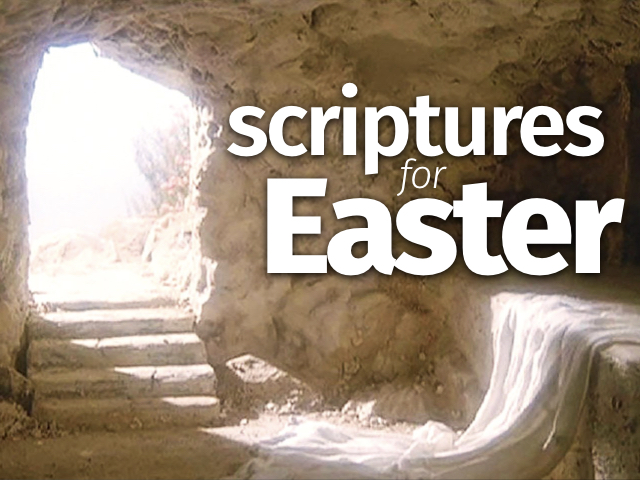
Luke 24.44-53.
After Jesus demonstrated to his students he’s alive—actually alive; he’s not a ghost, nor did he switch places with someone at the last second and get him killed (which is actually what Muslims believe). He showed ’em his hands and feet; he had ’em, unlike middle eastern ghosts, and clearly he’d been a victim of crucifixion, but was fine now. He ate fish. He breathed on them, in another gospel. He’s real. Solid. Alive.
This being the case, it’s time to have yet another little talk about what’s meant to happen to Messiah. The Pharisee beliefs which were still tangling up Jesus’s students, in which Messiah descends on Jerusalem, conquers it, conquers the Romans, and conquers the world? Yeah, he’s not conquering the world that way. Jesus’s initial victory had to be over death, not the government. He had to defeat sin, not some political party. Still true, no matter what Christian nationalists might claim.
- Luke 24.44-53 KWL
- 44 Jesus tells the students, “These are my words,
- which I speak to you while I’m with you:
- All which was written about me
- in Moses’s Law, the prophets, and the psalms,
- has to be fulfilled.”
- 45 Then Jesus opens the students’ minds
- so they can understand the scriptures.
- 46 Jesus tells them this: “This is what was written:
- Messiah is to suffer,
- and to rise from the dead on the third day,
- 47 and to preach of repentance in his name,
- of forgiveness of sins,
- to every people-group,
- starting in Jerusalem.
- 48 You are witnesses of these things.
- 49 Look, I send out my Father’s promise with you!
- Stay in the city till you’re clothed
- with power from on high.”
-
- 50 Jesus leads the students as far as Bethany.
- Lifting his hands, he blesses them.
- 51 This happens as Jesus is blessing the students:
- He’s removed from them, and is carried into heaven.
- 52 The students, falling down to worship Jesus,
- return to Jerusalem with great joy.
- 53 They’re always in the temple,
- praising God.
I should point out these last four verses seem to conflict with what Luke later wrote in his Acts of the Apostles. In Luke Jesus took ’em way out to Bethany and was raptured from there; in Acts it was Olivet, less than 2,000 cubits away. Ac 1.12 In Luke it looks like Jesus was raptured really soon after Easter, but in Acts Jesus hung out with them for more than a month. Ac 1.3 Certain people who hate the idea of any discrepancies in the bible will try to explain these bible difficulties away: “Well Jesus only led them in the direction of Bethany, but stopped at Olivet; and it only looks like it was really soon after Easter, but doesn’t say it was.” Yeah yeah, whatever. I don’t think minor discrepancies matter. The important thing is Jesus is alive, but the reason we don’t see him still walking the earth is Jesus was raptured.
On to the last words.
The usual past-tense translation.
If you’ve been Christian a while, you’ve heard this story before… but typically you’ve heard it with all the wrong verb tenses. Luke tends to use aorist verbs. That’s a verb tense we don’t have in English; our verbs are either present, past, or future, but aorist verbs don’t have a time attached to them, and can take place (or can have taken place) at any time. “Once upon a time,” perhaps. Or the future. Or right now.
Translators tend to turn aorist verbs into past tense verbs, because our history books are usually written in past tense. “Jesus went to synagogue” rather than “Jesus goes to synagogue.” But that’s not how the authors of the gospels were trying to tell Jesus’s story. How do we know this? Because when they weren’t using aorist verbs, they were frequently using present-tense verbs. They were saying, “Jesus goes to synagogue.” All the aorist verbs need to conform to those verb tenses. Conform to their writings, not to our customs of how a history book oughta sound. Conform to the rest of the bible… not our culture.
Anyway, because our English translations typically go with past tense verbs, they wind up creating a bible difficulty where there ought not be one. Namely verse 44:
- Luke 24.44 KJV
- And he said unto them, These are the words which I spake unto you, while I was yet with you, that all things must be fulfilled, which were written in the law of Moses, and in the prophets, and in the psalms, concerning me.
Jesus tells his kids, “These are the words which I spake… while I was yet with you.” Wait, you’re not with them? You just got finished proving to them you’re alive!—that you are with them! Heck, in Matthew 28.20 you said you were always gonna be with them! Does your resurrected life somehow not count? What’s going on here?
What’s going on is a bad translation. In verse 44 the first verb in the sentence is ἐλάλησα/elálisa, “I speak.” It’s aorist, so it can mean “I spake”… and it can also mean “I will speak. How do we know whether Jesus means present, past, or future? Context. What’s the next verb in the sentence? Δεῖ/dei, “it is necessary [that],” which is present tense. And if that’s present tense, Jesus is speaking about their present. He’s not quoting something he previously said—though it is something he previously said, multiple times. He’s saying something now.
While he’s yet with them. Because in a few verses he’s getting raptured, and they won’t see him anymore. Well, not all the time; he might make occasional appearances. But now that he has ’em all in the room with him, he’s gonna say this again, and make it clear: “You guys presumed Messiah wasn’t going to die. But I tell you he had to. So I did.”
Opening their minds.
I’ve heard more than one Christian (myself included) grumble, “Why’d Jesus wait till now to finally open the student’s minds ‘so they can understand the scriptures’? He had how many years to teach them this stuff? All those hours of walking up and down the Galilee and the Dekapolis and Judea, but he never bothered to switch on their brains so they could get him? What’s that all about?”
Likewise when this very same thing happened enroute to Emmaus. As they’re walking, Jesus “expounded unto them in all the scriptures the things concerning himself,” Lk 24.27 KJV and after he disappeared these students told each other, “Did not our heart burn within us, while he talked with us by the way, and while he opened to us the scriptures?” Lk 24.32 KJV He kinda opened these guys up too; Jesus’s death and resurrection finally seems to have made sense to them.
But I suspect a lot of Jesus’s ability to open them up, was because they first needed to suffer from the utter world-shaking shock of their Messiah getting killed.
You remember I had brought up the Pharisee beliefs about Messiah. This was what Jesus’s students had grown up with: The persistently-taught worldview that Messiah was gonna conquer the Romans. And not the way Jesus ultimately did it, by making ’em Christian: Through war. Through smiting them with a sharp double-edged sword, which unlike Revelation is not a metaphor for what he teaches, Rv 1.16, 2.12 but a literal sword. He’s gonna crush his enemies, see them driven before him, and hear the lamentations of their women.
In other words, he’s gonna do what they wanted to do to their enemies. And when dark Christians talk about Jesus doing the very same thing in his second coming… yep, they’re talking their vengeance and wrath. Not grace and peace. Ro 1.7, 1Co 1.3, 2Co 1.2, Ga 1.3, Ep 1.2, Pp 1.2, Cl 1.2, etc. They don’t have any of that, and in their mental images of Jesus, he doesn’t have any of that either.
So it was a profound jolt to Jesus’s followers when their Lord and Master died—even though he himself told them at least four times before it happened Mk 8.31, 9.9-10, 9.31, 10.33-34 that it was coming. Shouldn’t have come as a surprise to them!—and yet it blindsided them completely, threw them into despair, and stunned all of them that he came back. He foretold all these things, and they heard him say it, but they weren’t listening. Because they were so sure they understood the sequence of events. They’d been taught the Pharisee timeline all their lives. Messiah die? That’s not in the timeline!
Sometimes it takes getting our deeply-held beliefs completely shattered, like a glass jar that’s so broken there’s absolutely no way of gluing it back together. Sometimes it’s the stuff which turns into a monster of a faith crisis. Jesus’s death was that to his followers. It broke ’em. It had to break them; what he was teaching them wouldn’t sink in till it did! They had to learn to trust Jesus more than all the stuff they’d heard all their lives. In some cases they still had to learn it, ’cause Simon Peter had yet to realize the gospel is also for gentiles, Ac 10 and some of ’em had to learn you don’t have to first become Pharisee before you could become Christian. Ac 15
Before a faith crisis, Christians tend to be dead certain we’re right about things, and nobody can convince us otherwise. What causes the crisis is of course realizing we’re wrong—realizing we’ve always been wrong, and wondering whether we got anything right. The Holy Spirit cracked the shell we’ve put around our faith, and now he can open that up and teach us truth, if we let him. And that’s what Jesus does right here in this passage. Now that his students realize Jesus had it right all along, maybe now they’ll listen. Maybe they’ll stop making the mistake of thinking they have him all figured out.
Maybe the rest of us Christians can do that too.



